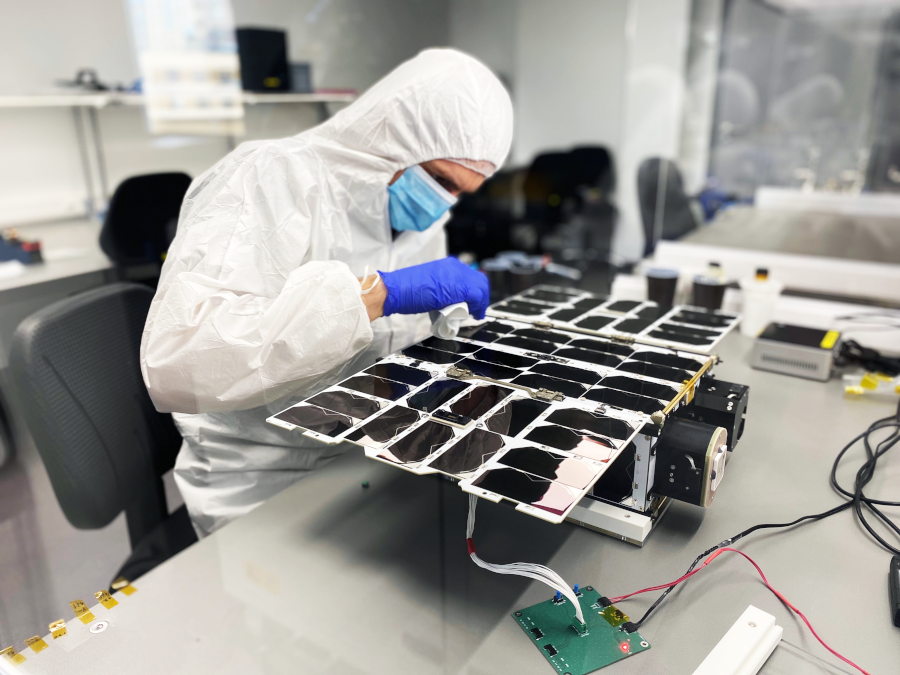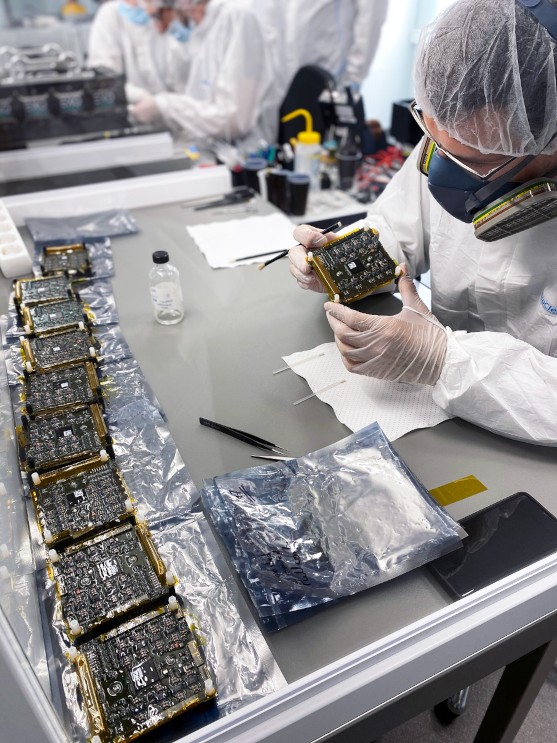This article is a profile of satsearch member NanoAvionics, developed in collaboration with the company and featuring the insights of Vaida Karaliūnaitė, Chief Marketing Officer (CMO).
Introduction
NanoAvionics is a nanosatellite mission integrator headquartered in Columbia, Illinois, USA, and with facilities in North America, Northern Europe and the UK.
The company manufactures a range of nanosatellite buses with a standardized configuration suitable for a wide array of applications, along with many other in-house developed sub-systems.
In addition, as a full service mission integrator NanoAvionics offers a range of services to satellite developers and operators including development support, consultancy and a hosted payload flight solution.
Mission services include, for example, payload integration, performance testing, spacecraft registration and logistics, frequency allocation and payload on-orbit operations.
In this article we take a look at how NanoAvionics began, what products and services the company offers today, and its recent achievements.
We’ll also share some insights on the company’s exciting future plans and thoughts on the progress and evolution of the space sector in general.

The company’s origins
NanoAvionics was officially established as a business in 2014, but the company concept, and associated R&D activities, began in 2011 by a group of aerospace engineering students following an internship at NASA.
Those students contributed to the development of spacecraft propulsion technologies and led a project to launch the first Lithuanian satellite into space by using the cost-efficient CubeSat standard.
This work evolved into a national project involving more than 100 space technology enthusiasts, sponsors, and partners, including Lithuanian President Dalia Grybauskaite who was an official supporter.
After the successful mission the natural next step for the team was to enter the developing nanosatellite market, bringing all of the knowledge and components developed throughout their project work to the commercial space sector. The company NanoAvionics was born in 2014.
NanoAvionics’ products and services
As a specialist nanosatellite technology manufacturer, and an established mission integrator, NanoAvionics has a wide array of commercially-available products and services.
This portfolio includes standardized buses in a range of CubeSat form factors, many in-house developed sub-systems, and a full spectrum of mission support services including launch brokerage, integration, flight readiness testing, logistics, satellite registration, mission operations and more.
The company has built bespoke facilities in all of the countries it operates to support day-to-day design and engineering activities including an ISO 7 class certified cleanroom with ISO 5 clean areas, thermal-vacuum chambers, and assembly and testing procedures that follow ESA’s standards.
The company’s products are flight-proven, space-qualified and 25 kRad tested. NanoAvionics also ensures that the long-term goal of mass production is embedded into all new designs.
Vertical integration and production principles taken from automotive and medical technology industries have helped NanoAvionics to develop products with competitive prices, short lead times, and high reliability. An overview of the company’s current commercial offer is included below:
Satellite buses
With 80% of hardware and software remaining the same for each mission, the standardized buses are readily-available for a variety of missions.
The Kongsberg NanoAvionics MP42H is a Microsatellite bus designed for space applications. It is a versatile system and has been optimized for high data throughput and complex communications missions and services. It is also suitable for research projects, emergency communications, and remote sensing services, and can be adapted to such applications with minimal reconfiguration.
The Kongsberg NanoAvionics M16P is a 16U nanosatellite bus designed for NewSpace applications. It is designed to provide a pre-integrated and pre-qualified platform that is fully tested electrically, functionally, and mechanically for a faster and simpler setup. NanoAvionics offers three M16P nanosatellite standard performance configurations – Light, Mid, and Max – providing options that best match customers’ payload, mission objectives, and budget.
The Kongsberg NanoAvionics M6P is a 6U nanosatellite bus designed for NewSpace applications. The M6P’s onboard systems are flight-proven and are pre-configured, to simplify and speed up integration. This allows customers to focus more time and effort on higher-level mission tasks, such as optimizing payload performance or testing new services.
The Kongsberg NanoAvionics MP42D is a Microsatellite bus designed for space applications. The MP42D comes equipped with a propulsion system to enable the satellite to perform high-impulse maneuvers such as orbital deployment and maintenance, precision flying, orbit synchronization, and atmospheric drag compensation.
The Kongsberg NanoAvionics MP42H is a satellite bus designed for Microsatellite missions. It is the smallest and lightest microsatellite bus and comes with an 8″ or 15″ ESPA-class separation ring for deployment in orbit.NanoAvionics offers three MP42H microsatellite standard performance configurations for 8″ and 15″ versions – Light, Mid, and Max – providing options that best match customers’ payload, mission objectives, and budget.
The Kongsberg NanoAvionics M8P is an 8U nanosatellite bus designed for NewSpace applications. It is designed to support NewSpace technologies and has been specifically designed for optimum performance in demanding commercial settings. The M8P can provide very similar average orbit power to a 16U nanosatellite, and improve mission capabilities and redundancy at only marginally increased production and launch costs compared to the M6P.
Recent achievements
In recent years NanoAvionics has undergone a period of significant expansion. With 300% growth each year and recognition growing in the industry, the company has been able to develop its operations while also improving core products and processes.
This has led to opportunities to work with and supply missions for some of the most innovative organizations in the field including NASA, ESA, and MIT, as well as private sector clients including Thales Alenia Space, SEN, and Lacuna Space.
As Vaida Karaliūnaitė explains:
“Realizing that our assumptions about the direction of the market, our own growth predictions, and the strategic steps we have taken were all very closely aligned has made it clear we are on the right track!”
The future at NanoAvionics
With a solid foundation and growing reputation in the industry, the next phase in NanoAvionics’ progress as a technology manufacturer will be driven by client needs.
The company has been preparing all aspects of their manufacturing capabilities and commercial structures to grow with its clients.
As their partners reach the final phases of the development, and start launching constellations and full services, NanoAvionics will be able to proceed with serial manufacturing and smooth scaling up due to the product mass manufacturing philosophy they have embedded. As Vaida explains:
“By standardizing our technologies and focussing on vertical integration we have been preparing for a number of years to help our clients scale up rapidly.”
The future of the space industry
As the space industry continues to respond to the effects of the global Covid-19 pandemic while also experiencing growth and disruption across many countries around the world, there are several emerging drivers of expansion that are having an impact on commercial activity.
NanoAvionics has highlighted several trends that are all playing a role in the company’s future market strategies:
Specialization – the ability of companies to develop precision-engineered, space-qualified components and sub-systems, that are highly reliable yet versatile enough for modern missions and services, requires specialization in key areas.
Standardization – the development of modular products, constellations, and the emergence of industry standards for certain technologies (whether formalised or informally regarded as best practice) has driven a lot of innovation in recent years.
For some clients however it is a standardization of result or service quality that is primarily required, as opposed to standardization of technology. The scope of each project is usually highly specific and NanoAvionics has identified that more and more clients are looking for turnkey mission solutions, where NanoAvionics can take care of all aspects of the mission and the client simply receives the data they need.
Application of industrial principles – scaled up mission servicing and mass production will require new approaches to product development as discussed above. NanoAvionics hopes that its work in this area will stand the company in good stead moving forwards.
Consolidation of market players – finally, another trend that we may see in the forthcoming years is an increase in mergers and acquisitions activity as the industry grows. It will be really interesting to see which companies stay independent and which determine that they can have more of an impact by combining with other players.
Amid such changes and developments the satsearch team is very pleased to be working with NanoAvionics and we are looking forward to helping bring more of their hardware and expertise to the global marketplace.
To find out more about NanoAvionics please view the company’s supplier page on the satsearch platform and click here to view the products.









